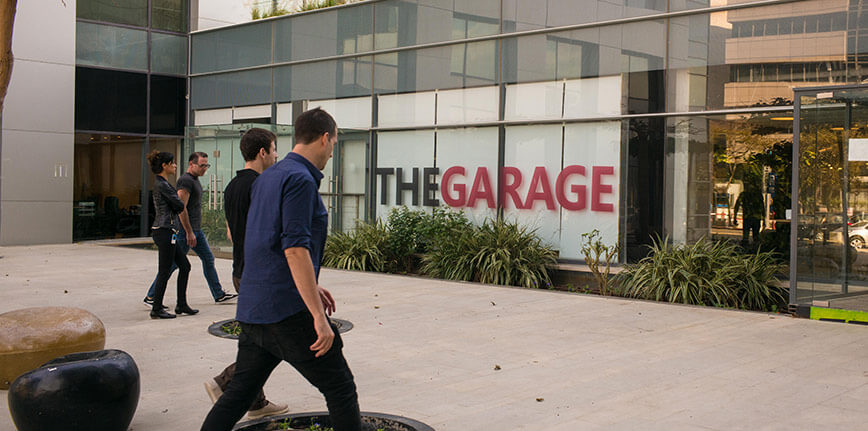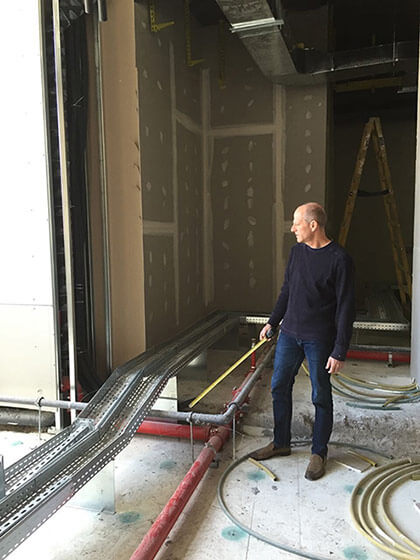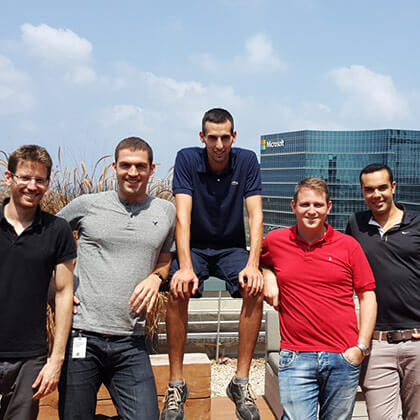
The Garage—Microsoft’s free-wheeling, no-holds-barred ode to hack culture—has come a long way. What began in 2009 as an underground offshoot of Office Labs has mushroomed into a global program inspiring Microsoft employees, interns, and the industry to reconsider how cultural reinvention and innovation can indeed happen.
Building from a passionate community of a few hundred people in 2013, The Garage has grown to many thousand active employees in 2016. The third-annual //oneweek Hackathon—held this past July and the largest private hackathon in the world—had over 16,000 participants globally as hackers and over 60,000 worldwide employees got involved. The Garage has also helped more than 75 teams across the company get experimental projects out to customers for feedback.
“It’s been quite the journey,” says Jeff Ramos. As leader of The Garage, Ramos is responsible for driving Microsoft’s hack culture and engineering experimentation. He’s also responsible for selecting the next Garage physical locations, in concert with Real Estate & Facilities (RE&F).
Spaces, Places, and People
“Our development of new Garage spaces has been defined by a pure and genuine desire to partner by both RE&F and us,” says Ramos. “RE&F listens to our vision, hears our business goals, and then thinks about how to best represent those outcomes through great architecture, design, and facilities.”
There are currently seven Garage spaces either open or under construction. Launched in 2013, The Garage at Redmond corporate headquarters is the flagship, with well-equipped and dedicated hacking and making spaces. Since then, two additional Garage locations have opened: Vancouver, BC in June, 2016, and Herzliya, Israel in July, 2016. The Silicon Valley Garage is now open and will host an official grand opening in upcoming months.
Three more Garage locations are under construction and slated to open in coming years: Beijing, China in the first half of 2017, Hyderabad, India in the second half of 2017, and Cambridge, Massachusetts in early 2018. “Over time, both we and RE&F are getting better at this. We’re learning by doing, which is the epitome of The Garage,” says Ramos.
What makes an ideal Garage location? They should have large concentrations of employees—a critical mass with a high level of diversity that is ripe for innovative thinking. They should have substantial interest and participation in Garage activities and the desire to build strong connections to local tech and higher education communities.
These criteria led to an initial focus on Microsoft Global Development Centers (GDCs). “While many sites are participating in Garage activities, we decided to bring dedicated facilities and staff to support the innovation that is already happening at the GDCs,” says Ramos.
The GDC-Garage Connection
The six Microsoft GDC locations provide access to the most leading-edge talent and markets. T. K. Rengarajan (“Ranga”), Corporate Vice President of Engineering for Microsoft, cultivates the global community of engineering talent. “Currently 31% of our engineers work outside of Puget Sound,” he says.
“We want to foster a culture that’s open-where employees are rewarded for thinking differently.”
Ranga is deeply committed to creating a work environment that inspires and motivates people. “Think about it,” he says. “An engineer that’s motivated is easily 10 times more impactful than one that’s not. It’s a simple fact. My goal is to create an environment that inspires our engineers—and that makes Microsoft the best place to work and build their careers.”
What goes into creating that kind of environment? The standard free food and fun diversions like foosball tables are only one part of the equation. The other is to cultivate an innovation culture—one that offers the best systems to empower engineers, and “only at Microsoft” opportunities that employees won’t find anywhere else.
“We want to foster a culture that’s open, transparent, collaborative, without boundaries—where employees are rewarded, not penalized, for thinking differently—and where failure is viewed as an opportunity to learn,” says Ranga. “Our GDCs, and RE&F’s efforts to create inspiring Garage spaces in these locations, are a critical component to that.”
Creating Spaces for Innovators and Makers
So what defines a Garage location? They generally adhere to a set of design principles, as proffered by Ramos and RE&F Global Workplace Strategies Manager Doug Lowrie. The two came up with design guidelines for creating three kinds of functional, flexible, highly reconfigurable spaces. These dynamic spaces showcase the collaborative and creative culture of Microsoft and are located in a highly visible part of the building to maximize exposure for passersby.
In essence, Ramos and Lowrie defined what kind of spaces make up a Garage location, and what goes into them. Collaboration Spaces are for events and meetings, and are open and accessible to the public. Maker Spaces have tools and equipment for prototyping and tinkering, and are open to employees and interns only. And Advanced Maker Spaces hold deeply technical prototyping equipment. These spaces are only accessible to highly skilled employees who have completed safety training and supervised hands-on training.
Lowrie chuckles, “I joke that the Advanced Maker lab is where you can start a fire or put out an eye. This is where we house the laser cutters, large CNC mills, a drill press, and a resin 3D printer.”
The Newest Garage: Israel
 The newest Garage in Herzliya, Israel was inspired by Nir Levy, Director of Academia and Garage Programs. Israeli universities are home to many of the top 20 computer science programs in the world, and Levy taught courses at several of them.
The newest Garage in Herzliya, Israel was inspired by Nir Levy, Director of Academia and Garage Programs. Israeli universities are home to many of the top 20 computer science programs in the world, and Levy taught courses at several of them.
What he saw in his students was a need to better understand the world away from their keyboards and computer screens. “I thought if they had the opportunity to build physical things and see all of the challenges in that, it would make them better developers. They’d really understand all the implications of the code they were writing.”
So Levy went to his senior leadership team with the idea of building a Garage in Israel. They liked the idea—and as they say, the rest is history. After 6–7 months of planning and 4–5 months of construction by RE&F, the Israel Garage opened this past July, serving both Microsoft employees and the local tech community.
“It’s truly an amazing space,” says Ramos, who recently visited. Levy agrees, citing the dramatic, all-glass construction. “It sits in the middle of the Israel GDC,” he says, “so everyone who visits and the employees who work there walk right past it and look inside.”
He also relayed the many challenges and complexities of the construction project. For example, protecting the equipment in a glass building in a place as sunny and hot as Israel. And controlling air quality and temperature in the 100-square-meter maker space, densely packed with machines. “There are literally four different systems just to circulate air,” he says.
Building a Community
Open less than six months, the response to the Israel Garage has been overwhelmingly positive. Long a hotbed for cybersecurity thought and technology, the Israel Garage’s first seminar, on drones, drew 200 of the GDC’s 1,000 employees. The local Surface team also uses the new Garage to build updated models.
Levy’s university students are using the space in droves, with over 100 students working on 30 different projects. Local companies are getting in on the act, too. “Every day, The Garage has a visit from a different company,” says Levy.
Interested businesses include local startup companies developing everything from Cloud-connected microphones to 3D sounds; to leading Israeli banks and financial institutions; to elite units of the Israeli army; to curators from Israel’s National Science Museum.
All of these businesses are a strategic resource for Microsoft, working in key industries of interest and value to the Israel GDC. So they gain access to The Garage for free.
“That’s a key advantage of Garage locations that we don’t always talk about,” says Ramos. “Through Garages, we mutually share knowledge and insights with business, government, and educational institutions that are of strategic interest for us.”
“They’re also, frankly, a recruiting tool,” says Levy. “We’re getting access to the best and brightest engineering talent from local universities and the surrounding communities. That’s invaluable to us.”
Supporting a Culture
“The benefits of having Garage locations are obvious, and they grow exponentially the more sites we build,” says Ramos. “Having a Garage shows that we are committed to the local community, and to being a thought leader and a resource for that community.”
He cites not just the new Israel Garage, but also the one in Vancouver, BC as an example. “It’s right in the heart of downtown Vancouver, and it attracts the best companies and individual developers. It shows our respect for the rich talent pool and wealth of technical knowledge there. We really made a statement to the city of Vancouver by building there.”
Levy agrees: “By building in the heart of the Israel GDC, and the heart of downtown Vancouver, we’re telling the world that we are a company that’s into innovation. This is a place where you can tinker and build and grow.”
Ranga sees the impactful, creative value of these Garages not just for employees, but also for the surrounding community. “These are beautiful workspaces that inspire everyone who sees them and serve to recruit new talent,” he says.
Making a Local Impact
 Shortly after the Israel Garage opened, local employees participated in the yearly //oneweek Hackathon. Israel won two first prizes: for ambient computing and wearable electronics. “We were really excited and proud to be able to accomplish this so soon after The Garage opened,” says Levy.
Shortly after the Israel Garage opened, local employees participated in the yearly //oneweek Hackathon. Israel won two first prizes: for ambient computing and wearable electronics. “We were really excited and proud to be able to accomplish this so soon after The Garage opened,” says Levy.
Other groundbreaking projects are coming out of the Israel GDC, taking advantage of The Garage to experiment and get projects out to customers for testing. Video Breakdown is one such project. Developed by the Israel Incubations Group headed by Ohad Jassin, Video Breakdown lets you search for videos about a specific topic, jump to key moments in the video, and share your favorite segments.
“With cognitive video indexing capabilities evolving so rapidly, we now have the power to understand what’s inside a video,” says Jassin. “Our goal is to build a powerful index for video content and design new experiences that leverage this index.” He expects Video Breakdown to be used in a variety of Microsoft products, from Bing Videos on the consumer side, to Azure Media Services for enterprises.
Formed over two years ago, the group is a small team of five people that operates much like a startup. “We look at areas that are highly relevant for the local ecosystem and markets—for instance, cybersecurity,” says Jassin. “If it happens to be a unique differentiator for Microsoft in Israel, we try to engage.”
Jassin is proud of his small “commando” team and the work they are doing. “The Israel GDC and The Garage, and the support from our local leadership team and throughout the entire company, is really unique. We have the support to experiment, fail, learn from our mistakes, try again, and then succeed. That makes us want to achieve more for the team and for our company.”
Growing the Movement
That support for The Garage permeates Microsoft—and senior leaders throughout the company are fully onboard. “The Garage program really took off when Satya Nadella started as CEO and saw the cultural impact of the first Hackathon in 2014,” says Ramos.
That’s why Ramos is committed to adding new Garage locations, as time and resources permit. In addition to Beijing, Hyderabad and Cambridge coming online in the next few years, Ramos is looking at additional locations. “There is a lot of amazing engineering happening beyond the six GDCs, and we want to cater to that. We want ideation and experimentation to happen everywhere at Microsoft.”
He continues, “Anywhere we can share the culture of The Garage, we’ll do it. And really, that’s all of Microsoft. That’s who we are now as a company—it’s part of our culture. So in collaboration with RE&F, we will continue making Garage spaces around the world.”







